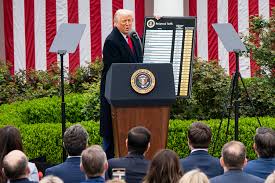As U.S. officials attempted to justify broad new tariffs that have sparked international unrest, a top economic adviser to U.S. President Donald Trump claimed on Sunday that more than 50 nations have contacted the White House to start trade negotiations.
In an appearance on ABC News’ ‘This Week,’ Kevin Hassett, the director of the U.S. National Economic Council, refuted claims that Trump was using the tariffs as part of a plan to destabilize financial markets in order to compel the U.S. Federal Reserve into lowering interest rates.
There would be no “political coercion” from the central bank, he declared.
Trump posted a video on Friday on Truth Social that implied his tariffs were intended to intentionally crush the stock market in an effort to compel lower interest rates.
U.S. Treasury Secretary Scott Bessent minimized the stock market decline in a separate appearance on NBC News’ Meet the Press, stating that there was “no reason” to expect a recession as a result of the tariffs.
Laptops 1000Trump’s announcement of broad tariffs on U.S. goods on Wednesday shook economies all across the world, causing China to retaliate and raising concerns about a global trade war and recession.
In the two days since Trump announced a new global tariff regime that was more aggressive than analysts and investors had been expecting, U.S. stocks have fallen by about 10%.
Market analysts and large investors have attributed this decline to Trump’s aggressive push on tariffs, which most economists and the head of the U.S. Federal Reserve believe risk stoking inflation and damaging economic growth.
Top Trump officials attempted to portray the tariffs as a shrewd repositioning of the U.S. in the global trade order and the economic disruptions as a temporary effect.
With the effect of Trump’s broad import taxes putting investors on edge following the worst week for U.S. stocks since the start of the COVID-19 crisis five years ago, tariff-stunned markets are in for another week of possible tariff volatility.
‘This Week’ on ABC News said that Trump’s tariffs had prompted “more than 50” nations to reach out to the White House to initiate trade negotiations.
On Sunday, Taiwanese President Lai Ching-te said Taiwanese companies will increase their U.S. investments and proposed zero tariffs as the starting point for negotiations with the United States.
He also pledged to remove trade barriers rather than impose retaliatory measures.
Hassett stated that, in contrast to other economists, he did not anticipate a significant impact on consumers because exporters were probably going to cut prices.
Bessent told NBC News that he would not expect a recession as a result of the tariffs, pointing to better-than-expected job growth in the United States.
“We could see from the jobs number on Friday, which was well above expectations, that we are moving forward, so I see no reason that we have to price in a recession,” Bessent stated.

















